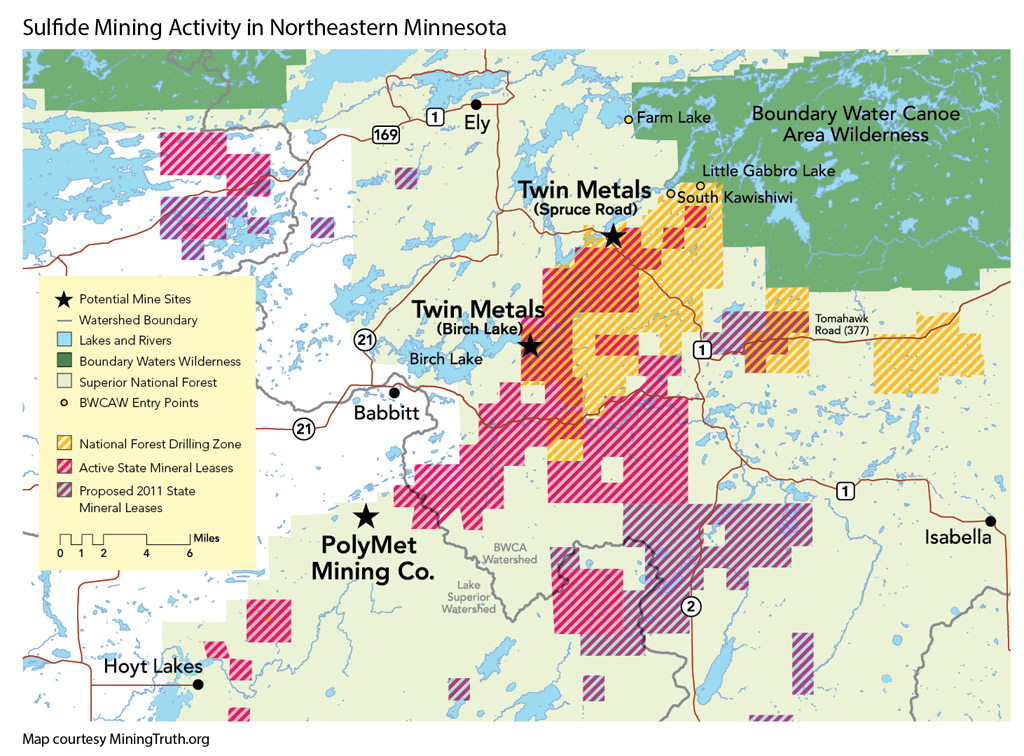
By Greg Seitz
Gov. Dayton declares opposition to copper-nickel mining in Boundary Waters watershed
Minnesota Governor Mark Dayton has halted new leases of mineral rights on state lands near the Boundary Waters Canoe Area Wilderness. He announced the decision in a March 6th letter to Twin Metals, the company seeking to open a massive copper-nickel mine on the South Kawishiwi River, just a few miles from the edge of the wilderness.
Dayton called the BWCAW a “crown jewel in Minnesota and a national treasure” and said he has an “obligation to ensure it is not diminished in any way.” For those reasons, he said he has instructed the state Department of Natural Resources not to allow any more mining or mineral exploration activities on state lands in the area.
Federal land managers reject automatic renewal of Twin Metals’ leases
The day after Dayton’s declaration, Twin Metals got more bad news. Two of the federal mineral leases Twin Metals owns were first issued in 1966, before modern environmental laws and the rigorous review now required. While the mining company had hoped to automatically renew its leases after they expired in 2013, the U.S. Bureau of Land Management (BLM) decided in March that environmental review would be required before the leases might be renewed.
An Interior Department’s lawyer told the BLM’s that Twin Metals does not have an automatic right of renewal to the leases and that the bureau has discretion to grant or deny the application. The original leases required mining to begin within twenty years, and Twin Metals is still only doing exploratory drilling on the leased land.
Twin Metals can still attempt to renew the leases, but the process of evaluating their application and conducting environmental review may take multiple years.
Rep. McCollum calls for watershed protection
Congresswoman Betty McCollum, representing Minnesota Fourth District, in the St. Paul area, continues to call for a moratorium on mining near the Boundary Waters. She sent a letter to three advisers to President Obama on February 2nd, asking for action to block mine development.
Writing to Secretary of Agriculture Tom Vilsack, Secretary of the Interior Sally Jewell, and Director of the Council on Environmental Quality Christina Goldfuss, McCollum requested the Obama administration deny renewal of copper-nickel mining leases on Superior National Forest lands, withdraw the area from new leases for 20 years, and halting all pending leases.
McCollum wrote, “Proposed sulfide-ore copper mining on federal land in the [Rainy River] Basin poses a direct, irreparable, and unacceptable threat to over one million acres of protected federal land and waters.”
PolyMet mine proposal completes environmental review
PolyMet Mining Corp. has been given the green light to move into the final phase of approval for its proposed project in the St. Louis River watershed. The state’s Department of Natural Resources and Governor, in charge of determining its fate, declared the proposal’s Final Environmental Impact Statement (FEIS) “adequate” on March 3, 2016, and said that the company can now apply for the permits it would need to mine.
The decision is a significant moment in the proposal’s long, difficult march, which began 12 years ago. The FEIS will guide upcoming decisions about whether or not the mine can legally and safely operate.
Since 2004, Landwehr said that government staff and contractors have put 90,000 hours of work has been put into the project. That about the same as one person working a full-time job for 45 years. He said it is the largest environmental review process ever undertaken by the agency. (PolyMet reimburses the state for all costs.)
Governor Dayton said he remains “genuinely undecided” on the project. “I don’t know what the permitting process is going to determine. I don’t know what changes the company is willing to make to satisfy those concerns.”
Poll finds public opposition to mining near Boundary Waters
Sixty-seven percent of Minnesota voters don’t think new copper-nickel mines should be allowed in areas where water flows toward the Boundary Waters Canoe Area Wilderness. That was the key finding of a February poll paid for by the Campaign to Save the Boundary Waters and conducted by Washington-based Anzalone Liszt Grove Research.
The poll also found that 65% of Minnesotan voters believe the Boundary Waters watershed should be permanently protected, including 59% of voters in northeast Minnesota’s Eighth Congressional District.
Originally published in Wilderness News Spring 2016 >

